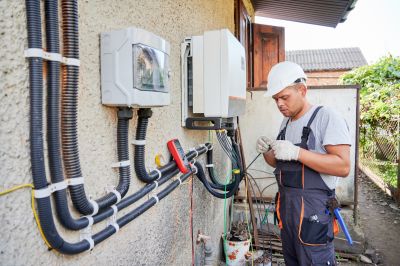Popular Electrical Inspection Tools For Professional Use
Discover the most sought-after devices designed to simplify electrical inspections and enhance your inspection process.
 Electrical inspections are a critical component of maintaining safe and functional electrical systems in residential, commercial, and industrial settings. Professionals and homeowners alike rely on a variety of specialized tools to assess wiring integrity, identify potential hazards, and ensure compliance with safety standards. These tools range from basic testers to advanced diagnostic devices, each serving a specific purpose in the inspection process. Proper selection of inspection products can enhance accuracy, efficiency, and safety during evaluations.
Electrical inspections are a critical component of maintaining safe and functional electrical systems in residential, commercial, and industrial settings. Professionals and homeowners alike rely on a variety of specialized tools to assess wiring integrity, identify potential hazards, and ensure compliance with safety standards. These tools range from basic testers to advanced diagnostic devices, each serving a specific purpose in the inspection process. Proper selection of inspection products can enhance accuracy, efficiency, and safety during evaluations.
Top Overall Option
Multifunction Electrical Inspection Tool
A versatile multifunction electrical inspection tool combines several testing functions into one device, including voltage detection, continuity testing, and circuit analysis. Its user-friendly interface and durable design make it suitable for both professional electricians and serious DIY enthusiasts. This type of device streamlines inspection processes by reducing the need for multiple separate tools, increasing efficiency and convenience.
Types of Products For Electrical Inspections
Voltage Testers
Devices used to verify the presence or absence of electrical voltage in circuits and outlets, ensuring safety before working on electrical systems.
Continuity Testers
Tools that check for electrical continuity within wiring and components, helping identify broken connections or faults.
Clamp Meters
Instruments that measure current flow without disconnecting wires, useful for assessing live circuits safely.
Insulation Resistance Testers
Devices designed to evaluate the insulation quality of wiring and cables to prevent electrical leaks and hazards.
Circuit Analyzers
Advanced tools that analyze electrical circuits, providing detailed information about voltage, current, and power consumption.
Ground Resistance Testers
Tools used to measure the resistance of grounding systems, ensuring proper grounding for safety.
Socket Testers
Devices that quickly verify wiring correctness in outlets, detecting common wiring issues.
Non-contact Voltage Detectors
Portable detectors that sense voltage presence without direct contact, providing quick safety checks.
Digital Multimeters
Versatile tools capable of measuring voltage, current, and resistance, essential for comprehensive electrical testing.
Thermal Imaging Cameras
Devices that visualize heat patterns in electrical systems, helping identify overheating components or faults.
Phase Rotation Meters
Tools that verify the phase sequence in three-phase systems, vital for proper motor operation.
Load Testers
Instruments that assess the capacity and performance of electrical systems under load conditions.
Arc Fault Circuit Interrupter Testers
Devices that simulate arc faults to verify the functionality of arc fault detection devices.
Voltage Data Loggers
Tools that record voltage levels over time, useful for monitoring electrical system stability.
Popular Choices
Widely used for quick safety checks, these detectors help identify live wires without contact.
Commonly used for measuring electrical parameters, versatile and essential for detailed inspections.
Popular for verifying wiring correctness in outlets, ensuring safe and proper connections.
Favored for their ability to measure current without disconnecting wires, enhancing safety and convenience.
Increasingly used for detecting heat anomalies in electrical systems, aiding in preventive maintenance.
Simple yet effective tools for quick circuit checks, often used by both professionals and DIYers.
Popular for ensuring grounding systems are functioning correctly, a key safety aspect.
Trusted for assessing insulation integrity, especially in high-voltage systems.
Essential in three-phase systems to verify correct phase sequence, preventing equipment damage.
Useful for monitoring voltage stability over time, aiding in diagnosing intermittent issues.
A comprehensive electrical inspection involves checking for proper grounding, verifying circuit integrity, and detecting issues such as short circuits or faulty wiring. To accomplish this, inspectors utilize a wide array of products designed to measure electrical parameters, test connections, and visualize electrical activity. Using high-quality, reliable tools helps prevent oversights that could lead to safety hazards or code violations. Whether conducting a routine check or troubleshooting complex electrical systems, having the right equipment is essential.
In addition to handheld testers, inspection products include multifunctional devices that combine several testing functions into one unit, offering convenience and versatility. Advanced products may feature digital displays, data logging capabilities, and compatibility with mobile devices for detailed analysis. Proper training and understanding of each tool's capabilities are vital for accurate assessments. Investing in a diverse set of inspection products ensures a thorough evaluation process and supports compliance with safety standards.
Ultimately, selecting suitable products for electrical inspections depends on the scope of work, the environment, and specific inspection requirements. While some tools are essential for all inspections, others are specialized and may be used less frequently. A well-rounded toolkit enables inspectors to perform comprehensive evaluations, identify potential issues early, and maintain high safety standards across various electrical systems.
Key Buying Considerations
- Compatibility with the specific electrical system or environment where it will be used.
- Range and sensitivity levels suitable for the inspection tasks at hand.
- Ease of use, including clear displays and intuitive controls.
- Durability and build quality to withstand field conditions.
- Battery life and power options for extended use.
- Portability and size for ease of handling and transport.
- Accuracy and calibration features to ensure reliable readings.
- Compatibility with other tools or data management systems.
- Safety features such as non-contact detection or overload protection.
- Availability of technical support and warranty services.
- Compliance with relevant safety standards and certifications.
- Price point relative to features and quality.
- User reviews and reputation within the professional community.
- Additional functionalities like data logging or Bluetooth connectivity.
- Ease of calibration and maintenance over time.
This content contains affiliate links. We may earn a commission if you make a purchase through these links, at no additional cost to you.
